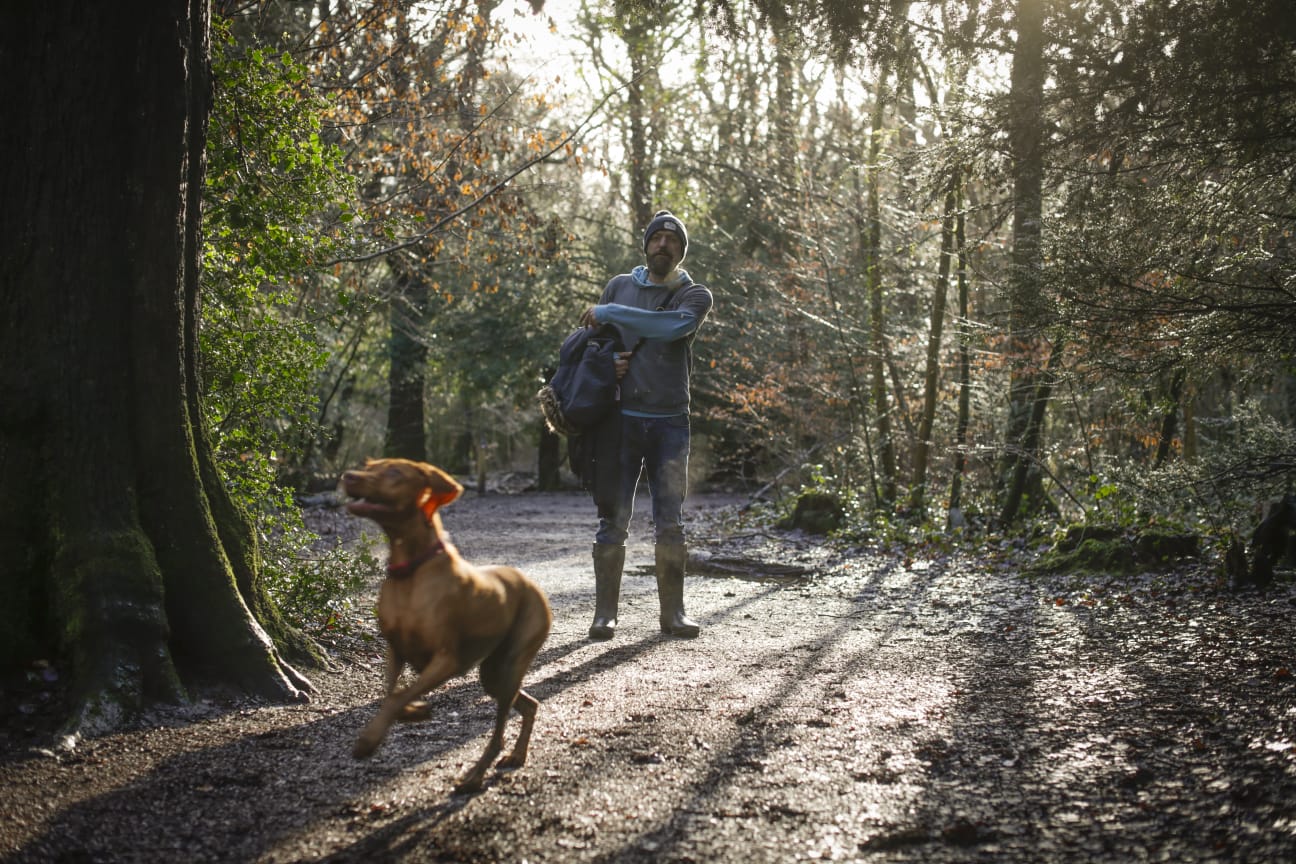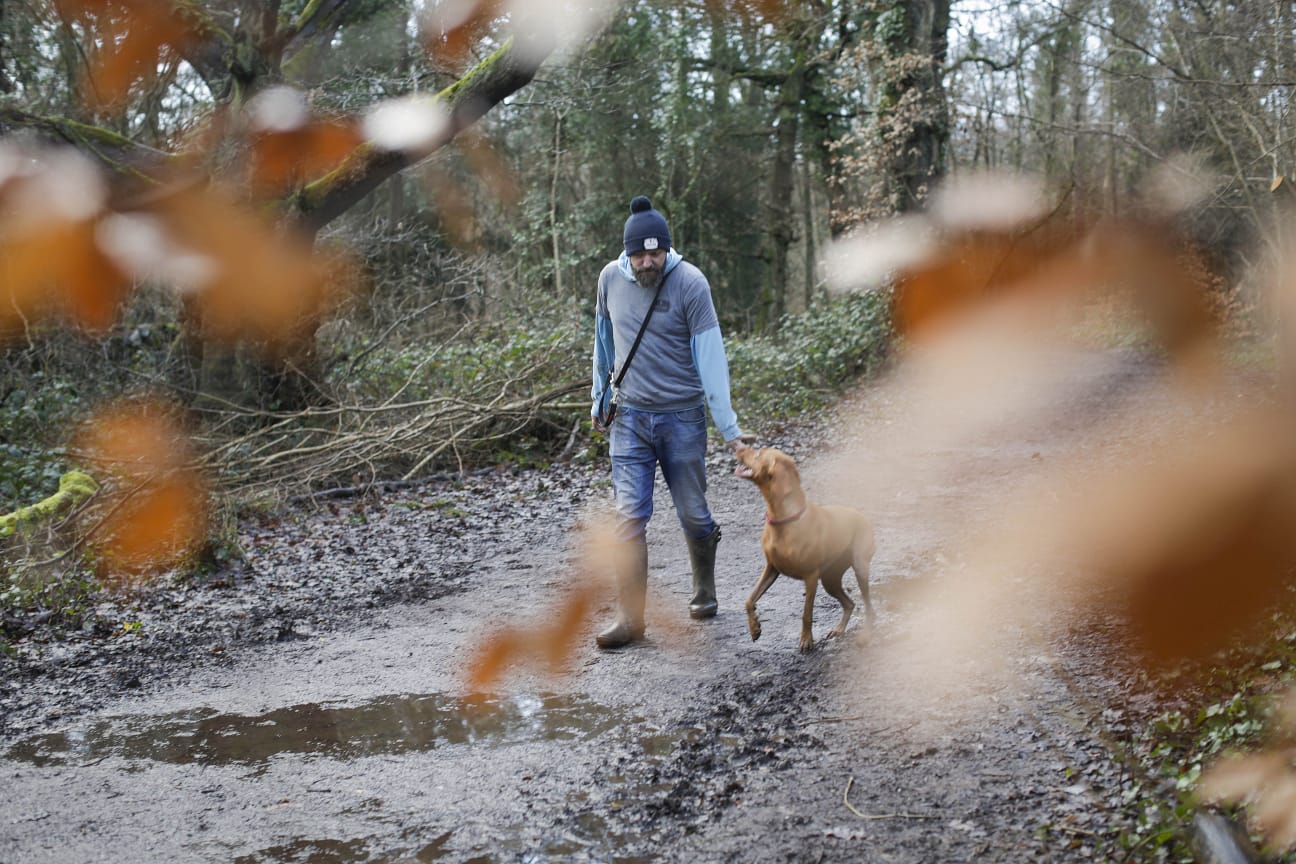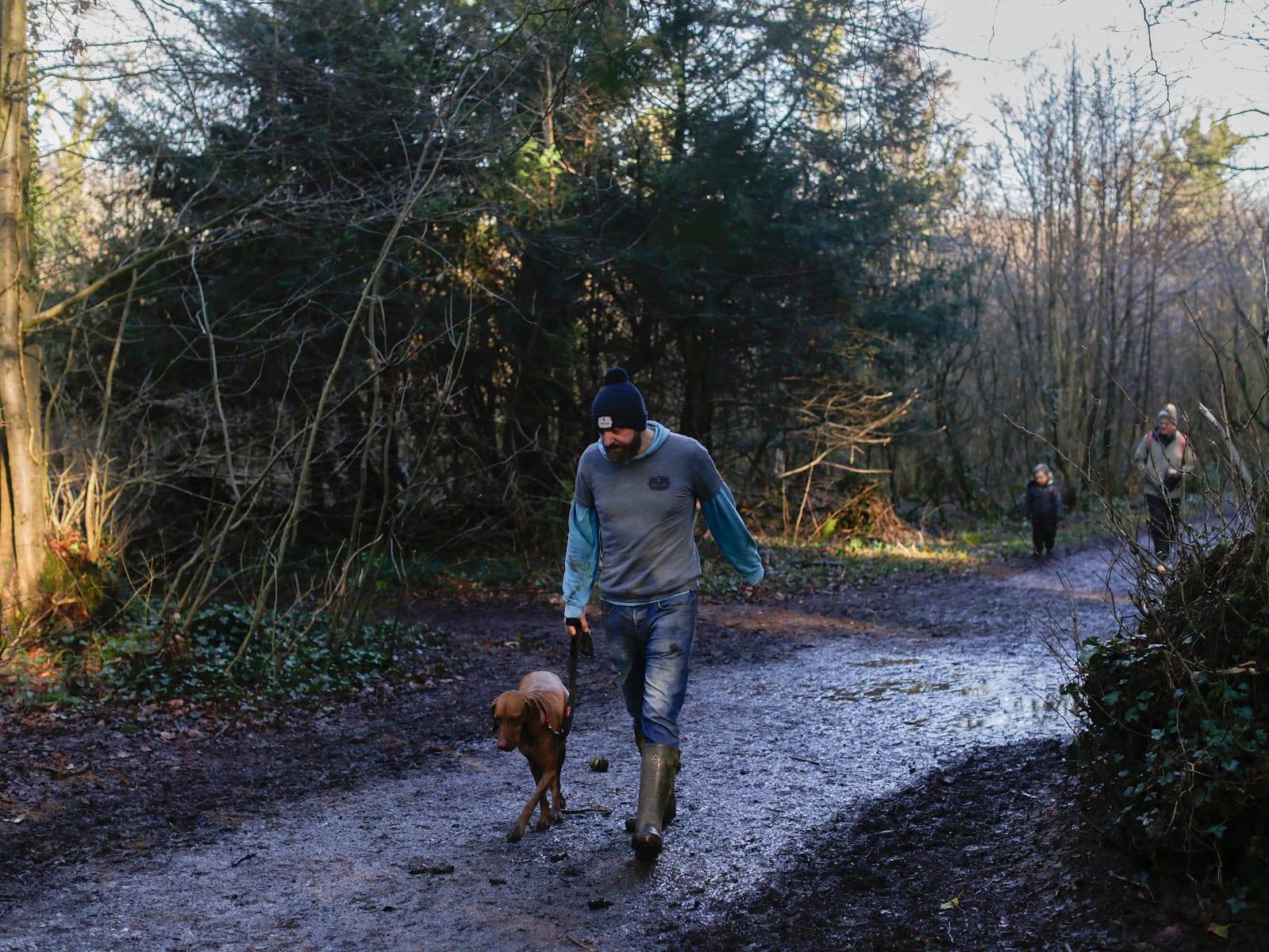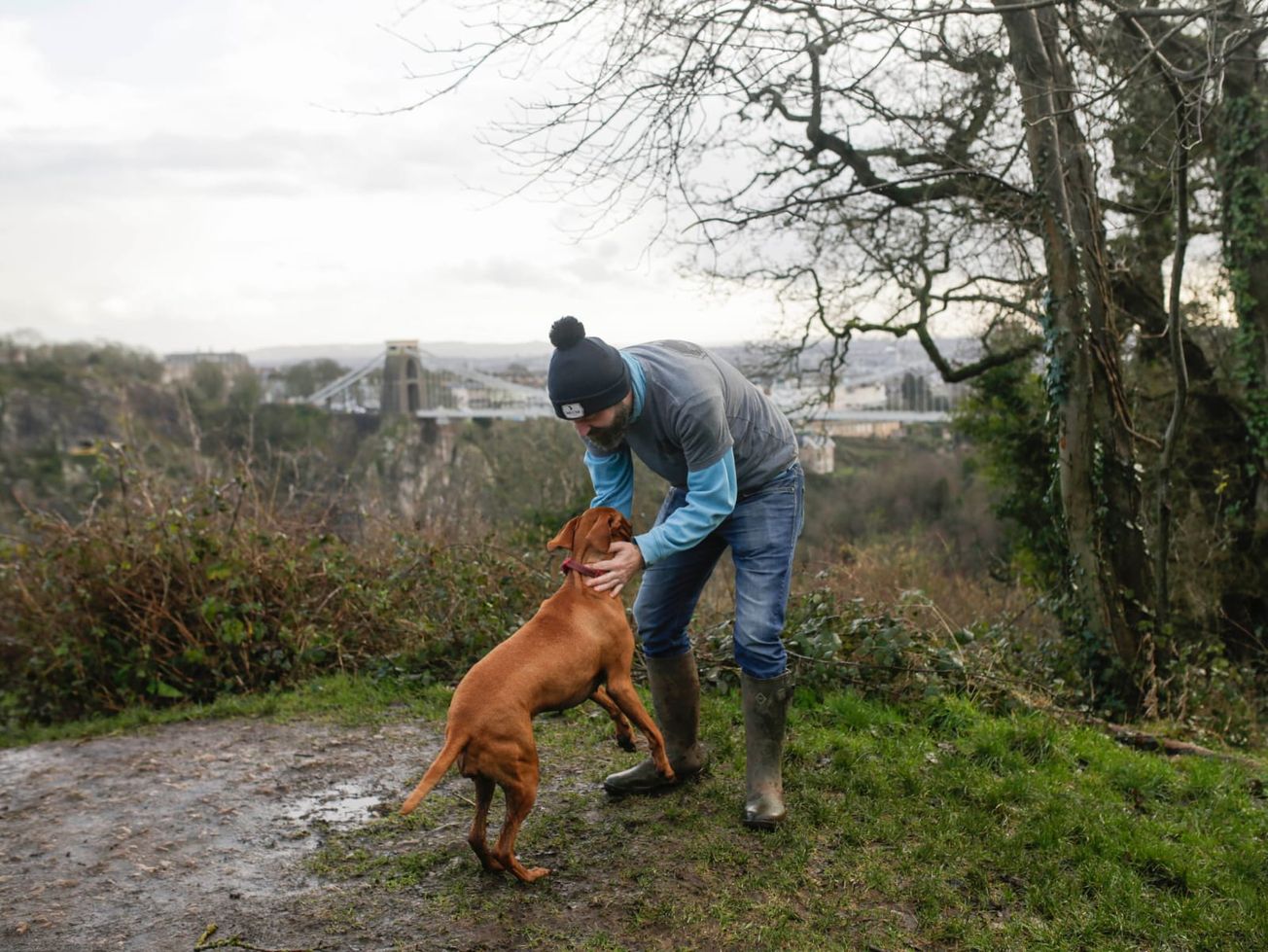By Robin Connolly, Features Editor
Epigram speaks to Rob Osman, the Founder of Dudes and Dogs about his project to help men open up about their mental health in Bristol.
‘So, tell me about your dog…’ has to be one of my favourite questions ever. Speaking to Rob Osman, founder of Dudes and Dogs Walk and Talk, might be one of the only chances I’ll ever get to sit down in an interview with someone and start by discussing their canine companion. Quite frankly? I’m buzzing.
When Rob starts to speak me about his five-year-old Hungarian Vizsla, Mali, it is clear that the two share a great bond. As with any dog owner I know, he is keen to inform me on her habits and of course, offers to show me pictures.
Rob worked in the corporate world for most of his life before having to take time off his job due to contracting Bell’s Palsy, the cause of which was subsequently put down to stress. ‘I knew I wasn't happy, but I also knew I'm about that typical age for blokes,’ he explains, ‘where you start to question your belonging in the world and your value and what you have contributed.’
I knew I wasn't happy Rob Osman
After taking some time away from work, he began to realise that he had an interest in men’s mental health, possibly in the realm of working with veterans suffering from PTSD. However, he came to realise that he was already reaching out to his male friends through his dog, inviting them to chat in the positive, friendly context of a dog walk.
‘I've had this idea about dogs in my head for a while - just in terms of how good they've been for me,’ he tells me. ‘Everyone knows getting in the fresh air is good for you. Everyone knows talking is good for you. And everyone knows animals can be great therapy as well. And why wouldn't you put them all together in one place?’
On the 10th of October 2019, Rob made a video for World Mental Health Day, about his idea for Dudes and Dogs, a Bristol-based dog walking support group for men to discuss their mental health. After running a couple of trial walks with a friend and another walker, the BBC made a video about the group, which was released on Boxing Day. Since then, Dudes and Dogs has gained support and enthusiasm at a rapid pace. Last week there were fifteen men who joined the group to walk.
he came to realise that he was already reaching out to his male friends through his dog, inviting them to chat in the positive, friendly context of a dog walk
As Rob confesses, ‘it's just been the fastest ride I've been on ever since. Sometimes the scariest.’
Rob and I begin to discuss the mental health record at the University of Bristol. The recent publishing of the 2019 UoB Mental Health and Wellbeing Survey has shown that mental health should still, by far, be a top priority topic for discussion on campus.
It highlights that there has been a rise from 41 percent to 48 percent of PGT’s showing depressive symptoms over the year and that almost two thirds of students repeating a year screen as positive for depression. It shows that ‘subjective wellbeing still appears to be much lower in Bristol students than 16-24-year olds nationally.’ Furthermore, it contained the shocking revelation that ‘22% of Bristol students admit to often or always feeling lonely – compared to 8% in 16- 24-year olds nationally.’
Rob and I talk about how university can be a breeding ground for negative thought processes. We discuss the general pressures of university life – from the expectations that come with academic work to sporting culture and even social media.
there has been a rise from 41 percent to 48 percent of PGT’s showing depressive symptoms over the year and that almost two thirds of students repeating a year screen as positive for depression
Rob recognises this, explaining that ‘university is a really difficult time of a time of life, full stop.’ ‘You're just discovering yourself - knowing who you are, you're becoming an adult.’ He goes on to explain that ‘you're away from home possibly for the first time ever. You may have anxieties around that you've never faced up to - I never admitted I got homesick.’
Bristol University students have 'longest wait in Britain' to get mental health support https://t.co/BJE9TU4mlY pic.twitter.com/Uk65gSKKZY
— Jim Dickinson (@jim_dickinson) September 18, 2019
Rob tells me how to him, ‘it's one of the most challenging times in terms of changing environments, isolation and meeting new people - an expectation that can be placed upon someone, and I have huge admiration for people that come through it as such rounded individuals’
Talking about the prospect of running a dog walk on campus (an idea Rob has for the future), he describes how dog walking at the university may give someone the first chance they’ve had to say to a peer: ‘I'm not handling this, I'm not doing well.’ He sees dog walking as a kind of alternative therapy and looks to encourage universities to start thinking more broadly about mental health and consider ideas like his that think outside the box.
you're away from home possibly for the first time ever. You may have anxieties around that you've never faced up to - I never admitted I got homesick Rob Osman
Stating that he believes that young minds have the ability to fluctuate so often between the good and the bad, Rob explains how ‘we can really help people if we put the right support and networks in place for students.’ He goes on, ‘if you can come out and you get some fresh air and change your mindset and have a conversation with someone who can talk you through and make you realise that what you're feeling is not unusual? I think that's got huge benefits.’
As Rob pitches his idea to me, I become more and more convinced that his idea works and will be really successful. ‘Can you imagine if there's a space, and there's six blokes going out - all of them feel like they're alone at university and they're isolated and that and they're having suicidal thoughts?
‘And they come on out and walk and they realise that there's five other blokes on that walk who feel exactly the same?
‘How powerful could that be?’ ‘It could be a really big, positive shift’.




For me, it’s something that I’ve only really come to realize and understand more this year, that everyone seems to have something going on. No one is ever just what they present themselves as on the outside, whether it be home, relationships, finance – nobody is living a ‘perfect’ life.
In a recent statement, publicly coming out as homosexual, Philip Schofield declared that ‘you never know what’s going on in someone’s seemingly perfect life.’ This really hit home for me and seems to be a point that Rob is getting at.
For someone suffering with their mental health, sometimes it is not easy to come forward, to open the book on their emotions. What Rob’s group is successfully doing for young men is to allow them to come forward on their own terms, as and when they need to, in a more casual environment than, say, a support group or therapy session.
He sees dog walking as a kind of alternative therapy and looks to encourage universities to start thinking more broadly about mental health
It is already a popular group, and demand is only growing. Rob explains that ‘people want it yesterday and I want to do it right.’ He is currently designing a training programme to train ‘Dude-Dogs’ to lead these sessions, so that they can ‘spread out around the country and then eventually go global as well.’
In an exclusive to Epigram, he tells me that the aim of this will be to show people that they already have the skills necessary to help people. The training will start causally, in conversation over coffee, to show people that just by making small talk and having conversations with people, they are already allowing people to open up – very clever.
There will perhaps be space for such training at the university, although that is a discussion for the future. In the meantime, I wish Rob nothing but luck. I left our conversation feeling massively satisfied. It makes me so happy to see passionate, caring people trying to change their bit of the world. Here’s to more fresh air, conversation and, of course, dogs!
| A fifth of Bristol students are ‘often’ or ‘always’ lonely
| Forty five per cent of Bristol students found to 'screen positive' for depression
Featured Image: Courtesy of Rob Osman
Have any thoughts on how animals can benefit mental health? Let us know!









